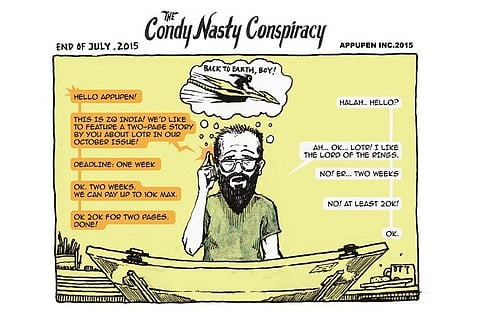

A graphic story could be art, a protest, or a taunt, or all three, depending on who you are. If you are the publisher who’s behaved unethically with freelancers, then art could be a taunt for you, an embarrassment.
There is a small but steadily growing group of people on Facebook who are sharing a short graphic story – just eight panels – that they can completely relate to. Apparently, they know what it’s like to be treated unfairly.
Graphic artist Appupen uploaded the story titled “The Condy Nasty Conspiracy” on his blog, as a last resort, a way of saying, ‘all right, you’ve out-muscled me, but I can still do this’. ‘This’, is a story about what not to do, if you are a freelancer.
Although he doesn’t take any names, Appupen is hardly subtle when he refers to the publishing house that approached him for some work. After several phone calls in which he requested the firm to send him the invoice, he realised that he had handed over the work according to the deadline but had not yet negotiated the terms of work. He was sent a document which would give copyright to the firm. He refused to sign it. Instead, he published the story he sent to the magazine on his own blog, along with the story of how he ended up not signing the contract.
So, why did he do it?
Legal action was out of the question because the expenses incurred would be far more than what was paid for the work, Appupen says. “Normally, the contract is discussed over a couple of days, and you arrive at the terms which are agreeable to both parties.”
However, despite repeated requests, the firm did not send him the contract until after the work was published, by which time, he realised it was too late to do anything.
“They know I can’t do anything about it. My artwork is with them, but I don’t have a contract. There’s really nothing else I can do. (And) I didn’t want them to do this again,” Appupen says.
With most of his work, even the books, the publishers have a lease on publishing his work for a fixed period of time, but the copyright ultimately rests with him. This allows him to add layers to his overall work, especially the stories that appear in book form.
Although Appupen did give his real name, he requested to be identified by his pen name for this story. Asked why he chose a name that means “grandfather” in Malayalam, Appupen quipped, “This Mallu Christian thing (name), is like giving an address. Apu is what I’m called at home, and it is a pen name, so Appu-pen. At that point I was trying to figure out (a lot of things) and I thought that it would keep my interest.”
Appupen took to graphic art full-time in 2006 and since then, he’s been largely creating the world of Halahala. He has also done work, mostly paintings, commissioned by corporate houses. His freelance publishing includes a strip on the rock music scene in India for Rolling Stone magazine besides work for a number of publications.
The rock music strip comes from experience. Appupen has been a drummer for 15 years, many of them with a band called Lounge Piranha.
Before he became a full-time graphic storyteller, Appupen did a stint in advertising for close to a year before calling it quits. “How do you be a party to a certain kind of life that you don’t believe in? (With advertising, it’s as if) you live by what the billboard says. If I’m going to influence other people, then I might as well do something I believe in.”
Appupen may mean grandfather, but the artist’s work is anything but benign. There is a terrifying darkness to Appupen’s imagery – if it is not the overt desperation and rage evident in the faces of some of his semi / sub-human characters, then it is the starkness of an empty life where a television screen welcomes you home, and offers you a hug.
Asked why Halahala, the world he created for his books – Moonward, Legends of Halahala and others – is so dark, Appupen says, “The concept of Halahala is a dark mirror of what we see around. From what I’ve seen and read, there is a lot of bubbly entertainment happening. (but) some stories that need to be told, people don’t want to listen to them. The world isn’t bright all around.”
Other influences include Mad magazine and his very own Kerala. “There’s something (about the place), there’s sarcasm. I mean, that’s the only place where people are criticising the government.”
Another reason he says Halahala is the way it is, is because to him, the worlds described by George Orwell and Aldous Huxley are the “two pillars of Halahala’s reality”.
“Orwell is about control, that’s what we fear. Huxley set up everything in terms of excesses – soma, sex, entertainment. People are so happy and not interested in anything. That’s what is being played out right now. Between Orwell and Huxley, we’re already there.”
(Images reproduced with permission from the artist.)